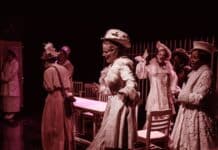It is the site-specific soundscape that grabs you and absorbs you: First, as you enter, ambient air raid sirens and bombs bursting, resounding around the underground tunnel you’re in as though there’s a military siege overhead. Then, as you walk along the vast tunnel’s dark curvature lit but by lanterns, you come upon two humans holding on to life in this conflagration, having taken refuge in a basement, now telling their fragile story punctuated by their own vocal emulations of munition fire — volleys of Bang-bang-bang! Ta-ta-ta! Buh-buh-buh-buh-ba-ta-ta-ta!!! —an oral onomatopoetics of fury and resistance, underscored by brazen brass interpolations improvised by this play’s eponymous trumpeter.
Inspired by true events, Ukrainian playwright Inna Goncharova composed The Trumpeter to bear witness to Russia’s months-long bombardment of the city of Mariupol in 2022. The play is set beneath a steelworks warehouse while that war of invasion wages overhead. The play’s main character and first-person narrator is an unnamed aspiring composer who, before the war, made his livelihood as a trumpeter in a marine brigade’s brass band, the other members of which are now all dead. He addresses us as though we are sheltered with him and he’s entrusting us, strangers, with his telling — or perhaps he is deliriously uttering aloud his traumatized mind as though no one else is there. Either way, it is as if we are personally privy to a harrowing wartime experience that no news report can deliver.

The musician whom we meet is attuned as much to silence as to gunfire and detonation. “War is cacophony,” he says at one point,” thus summing up why the unique acoustics of this underground venue serve Goncharova’s stark and trenchant play so perfectly. “I think God forgot the way to our basement,” the musician says, “or never knew it at all.”
The persistent combat-zone cacophony is literal — each bomb blast could mean death — and against its loud lethality, the musician has an artistic aspiration:
I’ve been trying to write. I always have my notebook with me – compact, slips into a pocket. I’m sketching out musical notes by hand: Bang-bang, bang, ta-ta-ta, uh-uh, ta-ta-ta-ta. A Symphony of War. If I finish it and stay alive to arrange and play it, it will be … a bomb. In a positive sense. If this word can have a positive meaning. I’m not doing it for fame, but to understand. To gain insight. Into the nature of war. Its origins, its essence, the restrained low pain of defeat and the sweet high note of victory.
He is trying to find in the destruction all around him sufficient harmony with which to create. Could there be a more apt metaphor for each true artist’s quest?
The ever-innovative Alliance for New Music-Theatre presented the DC premiere of The Trumpeter as a staged reading in Dupont Underground, which was once a trolley roundabout and is now a multipurpose arts space. The event was offered as audience participation in a development process that, in the fall, will result in a full production in this same super-echo-y space. On the basis of the preliminary reading, The Trumpeter promises to be a riveting theater event.
The part of the unnamed musician was imbued with enthralling emotionality by Michael Kevin Darnall, whose equal partner in authenticity was Lise Bruneau. She read several other characters in the script, including two shelter mates — a soldier named Kolya, a nurse nicknamed Nightingale — as well as the musician’s far-away beloved, Lubya, a beautiful soprano who has fled to the West and whom he knows he may never see again. Together, Darnall and Bruneau startled with their vocalizing sound effects of combat and simmered with resilience and a shared soulfulness as the trumpeter’s tale unfolded. For this reading, an actual trumpet player, Kevin McKee, enhanced their freestyle war sounds with riffs of improvised underscoring. They began reading by lantern light at a Ukraine-flag-draped table; later, they read from music stands on a Ukraine-flag-draped stage. The renowned Hungarian émigré director János Szász gave fascinating shape to the dramaturgy and brought to the whole experience an artful solemnity that held one entranced.

Within the musician’s winding monologue is a passage of surpassing theatricality: “Sometimes this whole basement feels like a theater set,” he says. Touchingly, he imagines his dead brass band mates are merely “offstage.”
Whether the composer finds the symphonic harmony and insight into war he seeks is left in suspension. His bunker mate Kolya isn’t optimistic: “War has no nature!” Kolya says. “Because it’s people who fight! War is in the nature of people. So it is better to write a song…”
The play’s raw depiction of death’s-door survival in a thus-far intractable war of aggression is deeply felt, and lucidly rendered by local acting eminences Darnall and Bruneau. If the musician character’s abstractly imagistic narrative is not always as clear as it might be when the play is fully staged, The Trumpeter text heard aloud testifies powerfully to art’s singular capacity amid the horror of war to inspire hope.
Says the musician, holding on to such hope:
Survival! This is the main task of each of us, no matter where we are: in the basement of this cursed industrial monster, in the occupied territories or right in the middle of hostilities. We all have to survive, because this war was intended by the enemy to destroy us. If we simply survive, it’s already a big victory.
Running Time: Approximately 70 minutes, no intermission
The Trumpeter was performed as a staged reading on April 28 and 29, 2025, presented by Alliance for New Music-Theatre in Dupont Underground, 19 Dupont Circle NW, Washington, DC. ANMT will present a full production there in November.
The Trumpeter
By Inna Goncharova
Poems by Peter Mironov
Translated by John Farndon
Directed by János Szász
With: Michael Kevin Darnall and Lise Bruneau
Trumpeter: Kevin McKee



